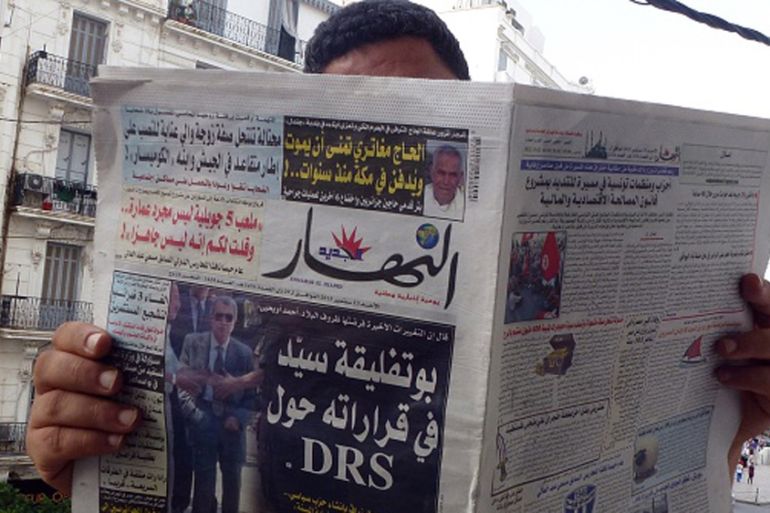A changing of the guard in Algiers
A new generation is slowly starting to replace the ageing veterans of the liberation war.

Rivalry between President Abdelaziz Bouteflika and his veteran head of intelligence, General Mohamed Mediene, has long informed Algerians’ understanding of the opaque politics of their country. Any change in the balance of power, the sages predicted, would unleash a struggle.
Instead, there has been a visible – if perplexing – stability since early September, when Bouteflika abruptly sacked Mohamed Mediene, 75, the world’s longest serving spy chief. The Algerian president, 78, was elected for a fourth term in 2014, despite not appearing in public since he suffered a crippling stroke the previous year.
“I no longer understand anything about Algeria,” confessed a college professor, shortly after spotting Said Bouteflika, the president’s brother and powerful right hand, casually drive down the highway with no escort.
|
|
Mediene’s departure from the scene is part of the deep and relatively silent changes taking place in Algeria as a new generation slowly starts to replace the ageing veterans of the liberation war. Since 2013, Bouteflika and his army chief of staff, Gaid Salah, have sacked a half-dozen generals close to the former intelligence chief.
Power grab?
Some interpret this as a power grab, but it is better to see it as an effort to professionalise the armed forces, promote a greater degree of civilian control, and deal with new security threats in Algeria’s neighbourhood since 2011.
Regional challenges are rising in North Africa and the nearby Sahel, with the Islamic State worming its way into conflicts in Libya, Tunisia, and Mali.
Also read: Algerian leader fires powerful army intelligence chief
Mediene, known by his nom-de-guerre “Toufik” or, more starkly, as Rab Djaza’ir (The Lord of Algeria) was widely seen as an all-knowing, all-powerful head of the KGB-style intelligence agency, the DRS. His removal is the coup de grace in a long-running power struggle between a regime faction centred around Bouteflika and another – dominant since the 1990s civil war – around Mediene.
Mediene, known by his nom-de-guerre 'Toufik' ... was widely seen as an all-knowing, all-powerful head of the KGB-style intelligence agency.
Mediene and other generals were behind the cancellation of elections and the military coup of 1992. His replacement fits into a large-scale restructuring of the DRS, aiming to strip away its powers over domestic politics and foreign policy, and refocus it on espionage and counterespionage.
Bouteflika was first elected in 1999 on a platform of national reconciliation, promising to restore politics to civilians with the famous words: “I won’t be three-fourths of a president”, an allusion to the military’s grasp on civilian leadership through much of the 1990s.
Even so, few Algerians saw this latest stage of the generational change coming. The country is used to an abiding continuity in the bureaucratic institutions that administer this secretive North African state.
Economic crisis
Many Algerians fear, however, that the fall in oil prices means that their country is barrelling straight into an economic crisis like that of the late 1980s. Officials estimate that the country can keep subsidies and social spending at current levels for at most another two years, risking riots and intense social unrest.
So, although the transition is proceeding smoothly at street level, there is much agitation in public discourse.
“I fear a general collapse,” former Prime Minister Sid Ahmed Ghozali told a public forum a few days ago. Retired General Hocine Benhadid accused the president’s brother, Said, of waging a campaign to break up all the country’s institutions so as to remain the sole in command. Former Prime Minister Ali Benflis has seized on a dozen occasions to indict what he calls a “power vacuum”.
Also read: Eroding Algeria’s political status quo
But with calm reigning over the country, top security officials and foreign diplomats are optimistic. Such interpretations spin the DRS restructuring as a poorly messaged modernisation of an ungainly and out-of-control security apparatus.
![Algerian President Abdelaziz Bouteflika [Getty]](/wp-content/uploads/2015/09/ac11ba24638d4cd48bc53a55aff53408_19.jpeg)
Violent extremism
New security leaders are not only younger; they are also being promoted on the basis of expertise in fighting violent extremism. With Islamist militants fighting on three of Algeria’s borders, Bouteflika appointed General Athmane “Bachir” Tartag to replace Mediene.
Tartag earned a reputation as being hands-on and disciplined over the course of his successful counterterrorism campaigns during the war of the 1990s. He seems in a strong position to protect Algeria from the Islamic State’s push into Africa, and is expected to enhance Algerian leadership in its Maghreb and Sahel neighbourhood, one of the state’s current strategic objectives.
If the leadership transition continues without incident, Algeria, by virtue of its geography and wealth, may fulfil its potential to be a boon for the stability of both the Maghreb and the Sahel. It opposes foreign interventions, supports territorial integrity, has encouraged dialogue and compromise with Islamists, and is willing to cooperate on counterterrorism operations and deradicalisation campaigns. It has already played positive roles in Mali, Libya and Tunisia at a time when many regional actors have fragmented or encouraged conflict and polarisation.
For Algeria to continue sorting out its internal affairs calmly is not just a domestic necessity: its neighbourhood needs it as an anchor in tumultuous times.
Hannah Armstrong is Algeria consultant for International Crisis Group.
The views expressed in this article are the author’s own and do not necessarily reflect Al Jazeera’s editorial policy.
